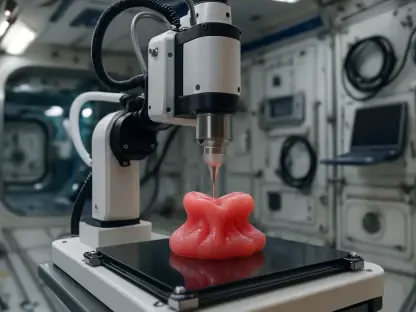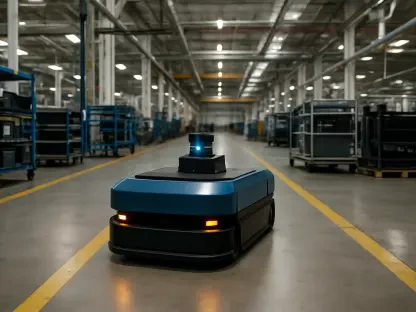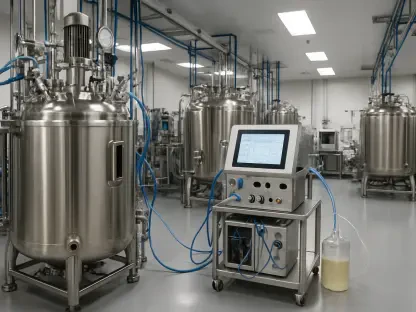The United Kingdom is paving a path toward technological leadership in robotics with its Industrial Strategy 2025, aiming to harness state-of-the-art technology for transformative industrial growth. This strategic framework sets out a clear vision to enhance robotics development by integrating industry advancements, ensuring the UK stands at the forefront of the global robotics industry. Central to this agenda is the Advanced Manufacturing Sector Plan, signifying an extensive commitment to fostering growth through innovative research, strategic investments, and progressive regulations that aim to eliminate existing barriers to commercializing robotics technologies. With a notable allocation of financial resources dedicated to this pursuit, the strategy reflects a comprehensive approach targeting enhancements in areas such as artificial intelligence (AI), smart factories, and industrial digital technologies. The roadmap outlined is ambitious yet pragmatic, investing heavily in infrastructure to nurture these cutting-edge technologies while aligning with global competitiveness benchmarks.
Investment Strategy and Technological Advancements
The strategy delineates substantial monetary investments geared towards robotics development, earmarking a remarkable £4.3 billion over a span of five years to propel advancements in robotics, AI, and related digital technologies. Such investments symbolize a strategic commitment to establishing robust foundations for technological growth within the industrial landscape, ensuring meaningful integration of these technologies across diverse sectors. This infusion of capital is set to catalyze research and development initiatives, providing businesses with the necessary financial influx to venture into innovative robotics applications. The Made Smarter Innovation (MSI) program stands as a pivotal player in the strategy, focusing on collaborative research and development projects designed to nurture the practical application of emerging technologies. Anticipating long-term impact, the MSI initiative has been allocated £29 million annually until 2030, accentuating the British government’s unwavering dedication to advancing consistent adoption and innovation in robotics and related fields.
The efforts to augment technological capabilities do not solely rest upon financial investments. Regulatory innovations underlie the strategy’s agenda to streamline processes and create an inviting business environment conducive to technological applications. By simplifying regulatory pathways for pioneering vehicles and robotics technologies, barriers hindering commercial deployment and innovation are addressed comprehensively. This inventive approach assures clarity and ease, enabling industries to innovate without encumbering regulatory impediments. The adjustment of regulatory frameworks aims to facilitate smoother transitions into the market for autonomous technologies, considerably enhancing the responsiveness of UK industries to rapid technological evolutions. Such advancements highlight the government’s proactive strategy to not merely adapt but anticipate industry needs, ensuring competitive relevance within the global market.
Sectoral Integration and Cross-Sector Collaboration
The expanded scope of robotics beyond traditional manufacturing settings marks a revolutionary shift within the Industrial Strategy 2025 framework, advocating for technological integration extending across various sectors. The initiatives outlined emphasize collaborative synergy between robotics and industries such as defense, automotive, and agriculture, promoting a holistic approach to sectoral innovation that redefines industrial frameworks. As autonomous systems become increasingly embedded within these sectors, the anticipated Defense Sector Plan underscores the potential growth areas in security technologies like drones and robotic defenses. Leveraging existing strengths, the focus gravitates toward enhancing human-machine interactions and autonomy that are perceived as crucial for advancing the UK’s defense capabilities, introducing sophisticated robotic systems and applications. Amplifying industrial collaborations, the strategy encourages cross-industry exchange of expertise, fostering environments where innovative applications of robotics can be optimized effectively. This collaborative approach reinforces a mutual understanding of shared technological goals and ensures sectoral readiness for integrating complex robotic solutions that transcend isolated industrial boundaries.
In parallel, the Made Smarter Adoption program is actively expanding its outreach to small and medium-sized enterprises (SMEs), providing up to £99 million by 2026 to imbue approximately 5,500 manufacturing SMEs with modern technologies. The presence of Robotics Adoption Hubs plays a pivotal role in this initiative, functioning as resource-rich centers equipped with the expertise vital for exploring and implementing robotic technologies. These hubs are instrumental in cultivating a vibrant culture of innovation within the SMEs, enabling fluid transitions into automated processes that significantly improve productivity and efficiency. By acting as conduits for technological dissemination, these hubs exemplify the strategy’s commitment to democratizing technology access and building resilient industrial frameworks that capitalize on technological advancements. The strategy thus delineates a structured approach aimed at amplifying industry potential through strategic sectoral partnerships and collaborations, promising transformative impacts that redefine industrial landscapes across the UK.
Financial Strategies and Global Market Positioning
Underpinning the Industrial Strategy 2025 are meticulously targeted financial strategies designed to bridge existing funding gaps, presenting a keen focus on bolstering industrial innovations to sustain technological growth trajectories. An insightful augmentation of the British Business Bank and the National Wealth Fund represents substantial capital infusions intended to catalyze advancements in strategic sectors, empowering businesses to fully capitalize on emerging robotics technologies. The British Business Bank’s expanded capabilities aim to provide an additional £4 billion, fostering momentum within the Advanced Manufacturing sector, focusing on strategic clusters inclusive of robotics. This increased financial backing symbolizes the government’s commitment to facilitating access to crucial funds that drive technological ventures forward domestically and internationally. Furthermore, an enhanced capitalization of £27.8 billion into the National Wealth Fund accentuates the long-term outlook required to capture opportunities engineered through robotics and automation. These financial initiatives denote a forward-looking resolve to sustain the UK’s competitive advantage within global markets powered by technological excellence.
Complementing these financial strategies, the Industrial Strategy identifies the imperative of integrated robotic solutions in reinforcing the UK’s global position in battery manufacturing and smart technologies across multiple sectors such as automotive, aerospace, and maritime. It highlights the strategic necessity to couple robotics with advanced technologies like AI, ensuring seamless technological fusion across varied industry landscapes. Targeting agri-tech emerges as a focal area, accentuating precision technology applications that leverage advanced sensors and AI to transform both domestic and international marketplaces. This strategic approach provides a clear roadmap outlining market positioning aspirations and emphasizes the UK’s resolve to be a frontrunner in applying robotics as central components of strategic industrial transformations across global sectors. By integrating financial strategies with clear technological objectives, the Industrial Strategy underscores the UK’s vision for maintaining a firm competitive footing in interconnected global markets driven by cutting-edge innovations.
Strategic Partnerships and Future Outlook
The United Kingdom is carving a path to technological leadership in robotics with its ambitious Industrial Strategy 2025. This plan seeks to leverage cutting-edge technology to drive transformative industrial growth. The framework outlines a vision to boost robotics development by integrating industry innovations, ensuring the UK claims a leading position in the global robotics sector. At the heart of this initiative is the Advanced Manufacturing Sector Plan, signifying a strong dedication to growth through innovative research, strategic investments, and progressive regulations designed to remove barriers to commercializing robotics technology. A significant portion of financial resources is allocated to this mission, reflecting a thorough approach that targets improvements in areas like artificial intelligence (AI), smart factories, and industrial digital technologies. This roadmap is both ambitious and realistic, focusing on substantial infrastructure investments to foster these advanced technologies while aligning with international competitiveness standards.









